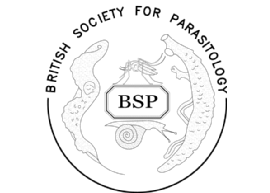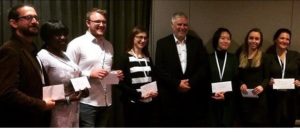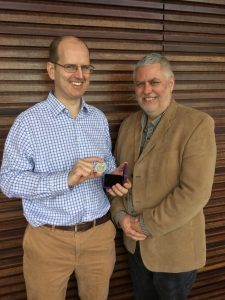
The timetable covered a full range of stimulating scientific parasitology, giving attendees a schedule bursting with opportunities to strengthen their own research interests, but also discover the advances being made in other fields such as drug discovery, veterinary parasitology, epidemiology, molecular cell biology, parasite diversity and much more.
The meeting was opened by two plenary talks. First, Klaus Brehm (University of Wuerzburg) gave us an insight into the complexity of signaling pathways present during the tapeworm Echinococcus multilocularis metacestode development, and drew similarities between this and the proliferation of malignant cells in human cancers.
This was followed by Mark Carrington (University of Cambridge) outlining his research on the evolution of the African trypanosomes haptoglobin-haemoglobin receptors present on the parasites surface coat, that allow this parasite to evade immune responses in both insects and mammals.
Host vs. Parasite
After a coffee break, Stephen Ward, Liverpool School of Tropical Medicine (LSTM), highlighted advances A.WOL have made in screening anti-Wolbachia treatments targeting the filarial parasites causing onchocerciasis and lymphatic filariasis. Over in Tropical Parasitology Khalid Beshir, London School of Hygiene and Tropical Medicine (LSHTM), warned us of the needs for tools to monitor the development and spread of resistance to the combination anti-malarial drug Sulphadoxine-pyrimethamine + Amodiaquine in seven Sub-Saharan African countries.
Resistance in intermediate hosts was also a topic covered by University of Nottingham PhD student Kehinde Sowunmi, who shared her data on the development of schistosome resistant or susceptible phenotypes in Biomphalria glabrata, and how the stress related Cu/Zn superoxide dismutase 1 gene catalyses a reaction for removal of the parasite from snail hosts.
Worms ‘In the field’
Shona Wilson (University of Cambridge) shared her insights into the slow development of immunity to schistosomes in endemic regions, explaining how using correct immuno-epidemiological data can aid in predicting the future success of control programmes, but also give insight into the force of transmission in at risk communities.
Hajri Alshehri (LSTM) continued on the theme of schistosomiasis, and highlighted the need for novel and sensitive diagnostics using serological-based methods alongside real-time PCR to estimate true prevalence of schistosomiasis where traditional methods (such as visualizing eggs using microscopy) fail due to the decline in egg outputs following successful treatments.
Also a lunchtime Wormbase workshop, which didn’t put us off our sandwiches, was run by Sanger’s bioinformaticians, who showed off their website (https://parasite.wormbase.org/).
A huge range of posters
After the first and second day of talks, 106 posters were presented alongside refreshments at lively and engaging poster sessions.

BSP council members Dr Justin Pachebat and Dr Poppy Lamberton judged and awarded 7 best poster prizes sponsored by PLOS NTDs, Parasites and Vectors and Malaria Journal. Congratulations to the winners that can be found here.
Current topics in malaria
BSP’s Day-2 had a very strong malaria theme ranging from elimination, epidemiology, immunology, genetics, potential vaccines and current news on latest malaria species P. knowlesi.
To kick start the day Eleanor Riley (LSTHM) gave a talk on the different stages of the P. falciparum development and how the human immune system responds. This journey of a human’s immunological response, from being “bug bitten” with transmission from mosquito to various human organs, gave insight into malaria-based B-cell, T-cell, and cytokine responses, thereby identifying groups for the next generation of vaccines: anti-sporozitic, blood-stage, liver-stage and transmission blocking.
The theme of liver-stage infection was explored by Maria Mota (Instituto de Medicina Molecular) who talked about how a host’s nutritional status affects the rate of infection in mice. Her team found that starvation reduced parasitaemia in liver-stage infection. This gave the whole audience a little food for thought and reminded us of a famous saying: “starve a fever, feed a cold”.
Regarding transmission, Thomas Churcher (Imperial College London) shared work of colleague Andrew Blagbourgh focusing on malaria parasite density using a mouse-to-mouse assay, which has shown how different generations of mice have varying parasitaemia, resulting in the implementation of transmission-blocking interventions.
“New bug on the block” P. knowlesi was discussed by Colin Sutherland (LSHTM) in an epidemiology session that used DNA/rRNA detection to establish P. knowlesi infections within Indonesian populations showing 11.8% of ~400 individuals harboured P. knowlesi.
In the spirit of elimination, Matthias Marti (University of Glasgow) ended the session with a talk on malaria elimination, pointing out new developments for this thousand-year-old plague.
Scottish Hospitality
As for hospitality, lunch allowed all attendees to socialise, network, and most importantly consume masses of Tunnocks Caramel Wafers and Teacakes!
Day-1, the annual Young Parasitologist Party (YPP) was held at Dukes Corner, giving an opportunity for student and early career delegates to meet their peers, and enjoy complimentary food, drink and some light entertainment (the infamous BSP pub quiz).

Day-2’s last agenda was a Scottish-themed gala dinner delivered with a traditionally hearty Scottish meal of haggis, neeps and tatties and all the trimmings, followed by a very lively ceilidh (see pictures!).
A leader in Parasite Genomics
Day-3 and last day was the Wright Medal Lecture given by Matt Berriman Wellcome Trust Sanger Institute,

who gave an overview of ongoing work at the institute such as the 50 Helminth Genomes Project opening up exciting new fields of research and discovery for parasitologists around the world. The talk ended with Dr Berriman being awarded a BSP Wright Medal by the BSP President Prof. Mark Taylor.
This award ceremony was followed by a final series of BSP talk, and was on all things parasitic: Leishmania, Trypanosomes, and Eimeria with a closing talk by Roman Susdorf (University of Aberdeen) on the effect of sea lice on wild Atlantic salmon fecundity.
So, the BSP-2017 Dundee spring-meeting had a full Scottish experience of a ceilidh, “haggis, sea nits and tatties”
This blog was written by Alison Mbekeani, a PhD student at Durham University with an interest in infectious diseases and currently looking at a potential drug target(s) in Toxoplasma gondii and Tom Pennance, a PhD student at the Natural History Museum and Cardiff University focusing on the transmission and genetic relationship between schistosomes, their intermediate host snails and the environment.
Additional information:
The 2017 BSP Autumn Symposium will be held on Thursday the 28th September at the Linnean Society (London) and will explore the understanding of host-parasite relationships, with a particular emphasis on the relationships of vectors and intermediate hosts of human disease
BSP acknowledge: Organisers Professor Mark C. Field and Professor David Horn, University of Dundee staff and students, Parasite & Vectors, Malaria Journal, Star lab, Caister Academic Press, Source BioScience, Royal Society Publishing, Elsevier, Cambridge University Press, GlaxoSmithKline for a successful 2017 BSP Spring meeting.

Comments